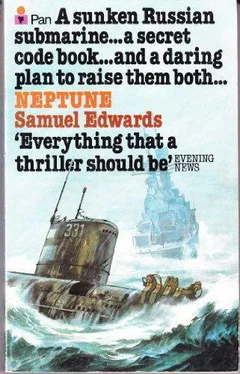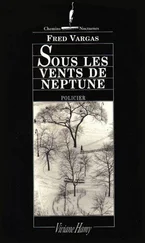When the float was about three feet from the surface, a touch on a button activated the claw, which moved into place directly above the target, then slowly lowered itself, dipping beneath the surface and grasping the half-ton bars. Once it held them securely it lifted them into the air, then carried them out of sight into the wall.
The submersible continued to rise, and soon reached the surface.
‘In the actual operation,’ Richards said, ‘at this stage we empty the float’s fuel, and the Neptune will take it in tow. By that time the Russian submarine will be safely stored on board.’
The ungainly little craft disappeared into its storage space, and the sliding doors closed. Franklin Richards pressed several buttons that turned off the power, and the demonstration came to an end.
‘Very impressive,’ Porter said.
‘Your tone indicates that you have reservations.’
‘I suppose I do. You work with this miniature equipment under controlled conditions. Ideal conditions, really. But in actual operations in the South China Sea, all sorts of things can go wrong.’
How well we know it. We’re gambling with hundreds of millions of dollars worth of taxpayers’ money, the lives of a great many people and my own time and efforts. There are no precedents to guide us, and we’ll have to learn on the job. As you’ve seen, we’re automating as much of the operation as possible, but machines are controlled by men, and one error in judgement can scuttle the whole project.’
They left the chamber, and security officers locked it behind them.
‘I’m not too worried about the Russians trying to get hold of the blueprints of your salvaging equipment,’ Porter said. ‘Even if they succeeded in duplicating it, they’d need years to build it. If they’ve caught on to the purpose of Project Neptune, they’ll do one of two things. Sabotage your operation, so their submarine stays at the bottom of the sea. Or wait until you’ve raised the Zoloto and then try to take it away from you.’
‘Which approach do you think they’ll take?’
Porter shrugged. ‘If I were in the KGB and given the assignment, I’d take a crack at both ways. Their object is to prevent the United States from learning some closely guarded secrets, so it doesn’t really matter how they do it. As long as they bloody well see to it that they ruin Project Neptune.’
They strolled down the corridor, in no hurry to leave the laboratory, and Richards was relaxing after his exertions. ‘I don’t envy you your job.’
‘My business is similar to yours in one respect,’ Porter said. ‘No one works in a vacuum. The trick is picking up clues in time to do something about them.’
The captain of Naval Intelligence approached them. ‘I have a telephone message for Mr Porter,’ he said. ‘You’re to call a Mr Blackman in San Francisco. He left no number, but he said it’s urgent.’
‘He’s undoubtedly at Corporation headquarters there,’ Porter said. ‘Can you put me through on a scrambler?’
‘I believe so. It’ll take only a minute or two to set one up.’
They went into an office, and as soon as the device was attached Porter made his call.
‘I flew down here from Washington state a few minutes after you left for San Diego,’ Blackman said. ‘I had a tip that’s turned out to be accurate. A friend of yours from Hong Kong has hit town and is looking for you.’
‘A lady friend?’
‘Right. She’s gone underground, so she won’t be easy to locate.’
‘I’ll come right up,’ Porter said. ‘Book me a room at the usual, the little place on the Hill, and I’ll take over. Does Adrienne know about this?’
‘Not yet.’
‘Phone her immediately, and tell her to establish a full alert until further notice. My friend’s arrival could be a sign of trouble.’
‘I know,’ Blackman said. ‘Maybe I ought to hang around and go sightseeing with you.’
‘You’re needed at the shipyard. And I’ll function best in this situation if I work alone.’
San Francisco’s Chinatown had the largest Oriental population of any city in the world other than in the Far East, and when Porter left the cable car at the corner of California Street and Grant Avenue he could almost imagine himself in Hong Kong. The community and its people were Chinese, and the tiny, open-fronted shops, the restaurants and the atmosphere resembled the world their ancestors had known in Canton, Shanghai, and Peking. But the dress of all but the elders was Western, rock music blared from the speakers of transistor radios and the streets were choked with oversized automobiles made in Detroit.
As in Hong Kong, the blend of cultures was successful but uneasy. The traditional values of the East and the mores of the West existed side by side without quite merging, and as a result the young respected neither. Their only gods were profit and pleasure, and the elderly men and women in black pyjamas who sat on doorstoops and before open, ground floor windows watched them in obvious, impotent disapproval.
Tourists relished the atmosphere, and Porter looked like all the others as he wandered through Chinatown, studying the architecture of Kong Chow Temple and window shopping interminably. After he had satisfied himself that he was not being followed, however, he walked a trifle more rapidly, and ultimately he slipped into a narrow alleyway on the side of a steep hill. Passing several tenements, he opened an unmarked door and went inside.
The interior was a small eating establishment, and every available foot of space was occupied by five rickety tables, all of them empty. The walls were bare, and the air was heavy with the scents of stale garlic, ginger, and fried onions.
Porter sat with his back to the wall, lighted a cigarette and waited.
After a time a middle-aged Chinese woman came into the room, wiping her hands on her apron.
‘Bring me some jasmine tea,’ he said, ‘and an order of noodles, Cantonese style.’
She vanished through a swinging door, giving no indication that she had even heard him.
Again there was a long wait, and then a man in his forties, with razor-cut hair and wearing a suit of hand-tailored gabardine came through the swinging door. Like so many San Francisco Chinese he was short and slender, indicating that his ancestors had been Cantonese.
Porter returned his stare.
‘Mac,’ the man said, ‘you came to the wrong place. This is a private club, not a public restaurant.’
Porter’s yawn was ostentatious.
‘Get to hell out, Mac.’
‘Tell Tom Lee,’ Porter said, ‘that his old Macao gambling partner is here.’
The man regarded him steadily before stalking off.
Porter rolled himself another cigarette and tilted his chair against the wall.
The man returned, beckoning, and led him through a crowded kitchen, then up a narrow flight of squeaking wooden stairs. Pausing outside a heavy door, he turned. ‘I’m going to frisk you,’
‘You’ll keep your hands to yourself,’ Porter said.
They glared at each other, and the man lost the contest of wills. He opened the door and conducted the visitor through a small anteroom.
The inner chamber was incongruously furnished in Scandinavian modern, and four Chinese sitting at a table were engrossed in a game of mah jong. The eldest of them, a burly man with greying hair, looked up from his rack.
There were no Tong wars in San Francisco any more, and Tom Lee was the primary reason peace had been restored, as the grateful police well knew. Occasionally the Chronicle or the Examiner referred to him as ‘the unofficial mayor of Chinatown’, but he was successful in avoiding publicity. If he ran Chinatown’s gambling and prostitution rings it had never been proved, arid Federal authorities, in spite of many investigations, had found no evidence connecting him with the sale of drugs.
Читать дальше












